Developed by Cyanide Studio, Published by Focus Home Interactive
Available for PC, Playstation 4, and Xbox One
The Basics
Playing as either Terminators in the Blood Wing Chapter or vile xenos Genestealers, you'll control your units to complete objectives and eliminate your enemy's units, resulting in you achieving victory or losing painfully. Matches are (hopefully) short, limited to a small series of pathways and rooms, with only a handful of units present. Each player has a small number of possible actions for their units during a turn, with the outcome of most interactions determined by dice rolls. A big selling point of SH: Tactics is the addition of Command Cards. Players earn 1 Command Point each turn, which can be saved or spent; Cards are played to give a player an edge by buffing their units (for Terminators) or debuffing enemy units (for Genestealers). Alternatively, cards can be converted into extra Action Points (for Terminators) or more Blips (for Genestealers). Within the litany of Space Hulk's ruleset lie many devious strategies and unconventional plays that are left to the player to discover for themselves.
Story & Flow
The general plot involves a squad of Terminators being sent into a particularly nasty Space Hulk to find a way to break it apart before it rams into an Imperial Forge world. The Terminator campaign delves into the details, while regular multiplayer skirmishes use it as a backdrop. As is to be expected from Warhammer 40K, everything is grim, dark, makes little sense, and is really cool. Though the characters are not terribly deep, you can at least admire their zeal. There is understandably a large disconnect between gameplay and story events; the cinematics never match up with the plodding, turn-based nature of the gameplay.
While the missions vary, they generally involve Terminators attempting to complete an objective and Genestealers trying to kill the Terminators. Sometimes the Terminators need to exterminate all xenos, reach an extraction point, or set and defend an explosive. Gameplay is pass-or-fail; if an attack succeeds the enemy dies, and if it fails the enemy lives, and in some cases they live and YOU die. Terminators are slow, with weapons that are liable to jam or explode at inopportune moments and can easily be flanked, though their firearms out-range xenos claws and grant powerful Overwatch capabilities. Genestealers lack range (outside of Command Cards), and must use their higher mobility and population to overwhelm their enemy. A Genestealer getting within range to attack a Terminator is likely to win the encounter, though it's entirely possible for a Genestealer to fail to kill a Terminator with his back turned after a woefully unlucky dice roll.
It is possible to make quick decisions, but the flow is regularly halted by each individual unit needing to be positioned and re-positioned, with every action playing out in its entirety. Moving 5 individual Terminators can take several minutes of strategizing, and managing a full assortment of Genstealers can go on for even longer. It's not exactly a flaw, though such a significant amount of downtime is an important factor to note.
Besides the player-VS-player portion, a campaign mode and mission creator are available. The campaign is comprised of a series of missions for both Terminators and Genestealers, gradually progressing through a map. Terminators have a more fleshed-out structure, with an actual story and a sort-of minigame between missions; the Genestealer campaign is more about a bunch of disconnected historical happenings as retold by an Imperial researcher. They are serviceable, but it serves mostly as a tutorial for multiplayer. The AI opponent is also wildly inconsistent, and difficulty can spike unexpectedly on random missions.
Graphics & Sound
In terms of fidelity, the presentation is admirable. Adaptations of units and the environment are (I assume) faithful with excellent lighting and decent texturework. Even generic Terminator suits get small variations to differentiate them from their brothers. When playing as the Terminators, you have the option of entering a first person mode, which, while incredibly inconvenient for tactical use, heightens the atmosphere. However, the UI is quite cluttered, bombarding the player with information and often overlapping other UI elements. Animations are pretty enough, like when Terminators and Genestealers duke it out in melee combat, but sometimes bug out in strange ways.
Music tracks work to highlight the tense mood without overtaking the scene, which is nice when sitting and thinking about your next move. Sound effects range from the thumps of Terminators walking to the hiss of ancient door locks; in general, sound design is very well-made. Imperials tend to speak as though they have a dictionary surgically implanted in their brain, and the voice work is similarly bombastic. Unfortunately, I experienced frequent stuttering and crackling, and more than one crash.






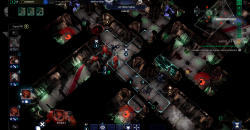
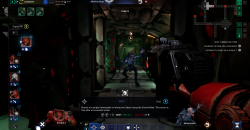
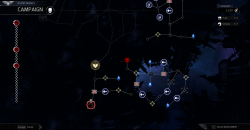
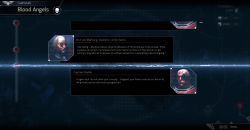
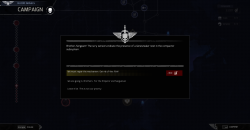
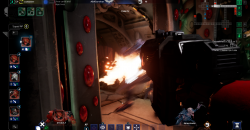

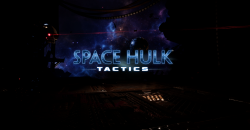
G SDGSDGS
jni
класс